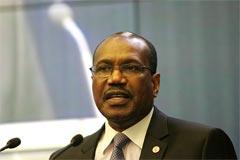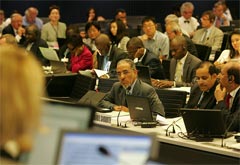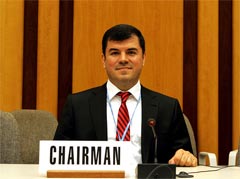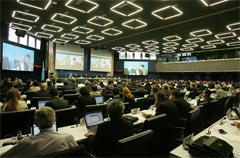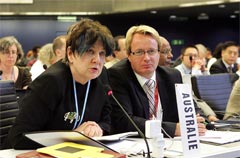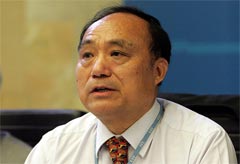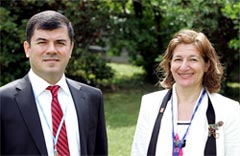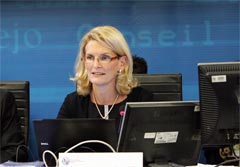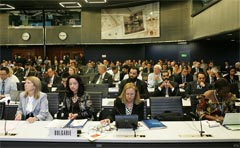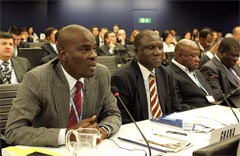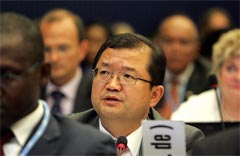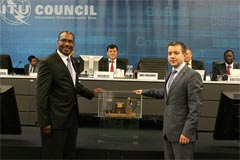
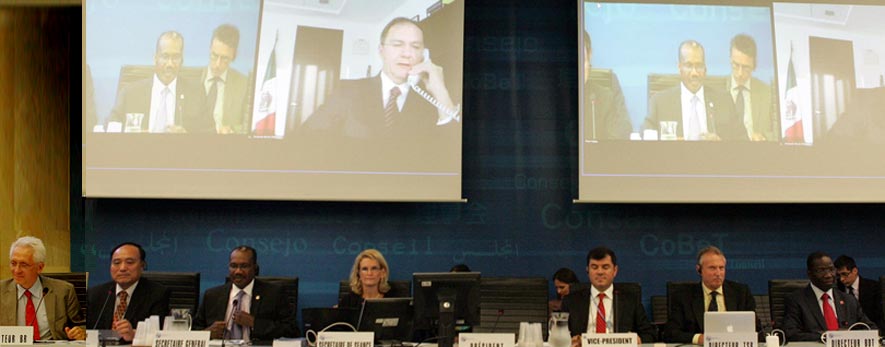
| Next » | ||||||||||||||||||
| Issue No. 1 | Geneva, 4 July 2012 | |||||||||||||||||
|
|
||||||||||||||||||
Council opens in Geneva with great expectations for the future of the ICT sector worldwide |
||||||||||||||||||
|
TThe Council’s 48 Member States are meeting from 4 to 13 July 2012 with great expectations for the future growth of the ICT sector worldwide. Speaking at the inaugural plenary session on 4 July, ITU Secretary-General Dr Hamadoun Touré; Fernando Borjón (Mexico), outgoing Chairman of Council; and the newly elected Chairman of Council, Ahmet Cavusoglu (Turkey) spotlighted the major events that will shape that future:
Much of the
Council’s focus
will be on the
preparations for
these events.
Speaking of
WCIT-12, Dr
Touré called for
openness and
transparency,
and asked the
Council to
consider
granting open
access to the
WCIT-12
documents, as
well as agreeing
to the holding
of an open
consultation,
accessible to
all stakeholders
worldwide,
regarding the
International
Telecommunication
Regulations
(ITRs) to be
reviewed at
WCIT-12. Council observes a minute of silence in tribute to the memory of Richard Butler
The Secretary-General’s State of the Union addressIn his State of
the Union
address, Dr
Touré chronicled
ITU’s many
achievements
since the
previous Council
session, which
took place last
October.
Leadership of Council 2012
Dr Cavusoglu,
Head of Turkey’s
Department for
International
Affairs,
Information and
Communications
Technologies
Authority
(Region B –
Western Europe),
was elected
Chairman of this
year’s session
of the Council,
taking over the
rotating
chairmanship
from Region A
(The Americas).
The
vice-chairmanship
this year falls
to Region C
(Eastern Europe
and Northern
Asia). At the
time of writing
this Issue of
the Highlights,
negotiations
were still going
on with Council
Member States
from that
region. The agendaIn addition to
the many events
listed above,
the Council will
examine the
implementation
of the
operational
plans of the
Union’s three
Sectors and the
General
Secretariat for
2013-2016. It
will also track
the progress
made by Council
Working Groups
on Financial and
Human Resources,
on a Stable ITU
Constitution and
on Child Online
Protection,
among others. Council approves report on the implementation of the Strategic Plan and activities of the Union for 2011-2012The report
presented by ITU
Deputy
Secretary-General,
Houlin Zhao, was
fully endorsed
by the Council.
It covers the
main activities
of the Union
over the second
half of 2011 and
the first two
months of 2012
(Document
C12/35). The
report is
prepared in
response to
Resolution 71
(revised at the
Guadalajara
Plenipotentiary
Conference). It
analyses how the
Strategic Plan
has been carried
out, in
pursuance of
results-based
budgeting and
management, and
linking the
strategic,
financial and
operational
plans as per
Resolution 72
(also revised at
Guadalajara).
Country profiles of progressSeveral
countries took
the floor to
highlight their
national ICT
plans, their
recent
achievements and the
importance of
the role of ITU
as a United
Nations
specialized
agency in the
field of ICT.
These included
Costa Rica,
Ghana, and
Honduras – with
Serbia thanking
ITU for its
efficient and
professional
efforts in
helping the
country rebuild
its destroyed
public
broadcasting
system in
accordance with
Resolution 126
of the
Guadalajara
Plenipotentiary
Conference, and
Resolution 33
(Rev. Doha,
WTDC-06). Serbia
has submitted a
document
requesting the
Council to
consider
allocating the
necessary funds,
within available
resources, to
help continue
this action
successfully. Preparations under way for the Plenipotentiary Conference in 2014 in the city of BusanMr Jae-You Choi
from the
Republic of
Korea gave a
brief account on
preparations for
the
Plenipotentiary
Conference in
2014 (PP-14) in
the city of
Busan. In April
2011, a Task
Force was
established
within the Korea
Communications
Commission. In
July the
Pre-preparatory
Secretariat was
established
under which two
additional teams
and various
private-sector
experts were
invited. In the
second half of
2012,
organization of
PP-14 will be
expanded at the
national level
to include all
relevant Korean
government
bodies. To this
end, the
government
issued a Decree
on 28 June,
which was
approved by the
country’s
President and
was enacted on 1
July, providing
legal ground for
the preparatory
process. “We
expect such
legal measures
will spur more
enthusiasm and
passion in our
future endeavour,”
Mr Jae-You said,
adding that the
Republic of
Korea is making
efforts for
PP-14 to become
a global
festival. “To
this end, we are
planning various
events and
programmes, and
will continue in
our best efforts
to introduce the
conference to
the whole
world.” The
Republic of
Korea is in the
process of
“formulating a
basic broad plan
for the
conference by
gathering
domestic and
international
experts from the
ICT and the
other sectors as
well,” he also
said, inviting
“genuine and
insightful
advice from the
Secretary-General
and the ITU
people”. As part
of the
preparatory
process, the
Korean
government has
invited Dr Touré
to visit the
country in
September this
year. Gift from the Russian Federation
The Russian
Federation’s
Minister of
Telecom and Mass
Communications,
Nikolay
Nikiforov,
outlining the
history of
telecommunications
in his country
presented to the Secretary-General a model of the first radio which was the forerunner of more modern radiocommunications.
Accepting the
gift, Dr Touré
stated that the
radio would be
kept in ICT
Discovery –
ITU’s brand new
interactive
museum – for all
to admire. Not an official document – For information only. |
|
|||||||||||||||||
 Richard Butler
was Deputy
Secretary-General
of ITU from 1968
to 1982, and
Secretary-General
from 1983 to
1989. Mr Butler
passed away on
23 June 2012, at
the age of 86.
Announcing this
sad news, Dr
Touré asked
delegations to
“take a moment
to remember one
of the most
active
supporters of
ITU and his work
over the past
half century.”
After leaving
ITU, Mr Butler
continued to
play a very
active role in
ITU’s work,
remaining fully
engaged until
just a few weeks
ago. “He was in
Geneva earlier
this year for
the
Radiocommunication
Assembly and the
World
Radiocommunication
Conference. He
will be very
much missed by
all of us”, said
Dr Touré,
inviting
delegates to
“share their
memories of this
most exceptional
and inspiring
man” in the
condolences
book, which will
be passed on to
Dick Butler’s
family. The book
will be
available
outside the
Popov meeting
room for the
duration of the
Council session.
Richard Butler
was Deputy
Secretary-General
of ITU from 1968
to 1982, and
Secretary-General
from 1983 to
1989. Mr Butler
passed away on
23 June 2012, at
the age of 86.
Announcing this
sad news, Dr
Touré asked
delegations to
“take a moment
to remember one
of the most
active
supporters of
ITU and his work
over the past
half century.”
After leaving
ITU, Mr Butler
continued to
play a very
active role in
ITU’s work,
remaining fully
engaged until
just a few weeks
ago. “He was in
Geneva earlier
this year for
the
Radiocommunication
Assembly and the
World
Radiocommunication
Conference. He
will be very
much missed by
all of us”, said
Dr Touré,
inviting
delegates to
“share their
memories of this
most exceptional
and inspiring
man” in the
condolences
book, which will
be passed on to
Dick Butler’s
family. The book
will be
available
outside the
Popov meeting
room for the
duration of the
Council session.


